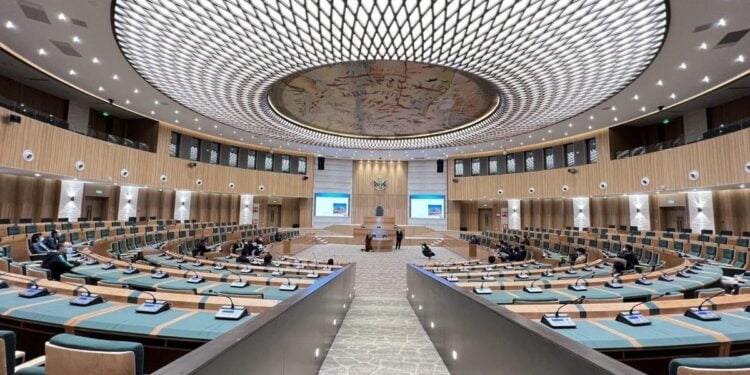The President outlined the government’s legislative agenda in his State of the Nation Address on the 3rd October 2023 at the ceremonial opening of the Tenth Parliament of Zimbabwe. The agenda is set out below:
The President began by specifically naming the following five Bills from the Ninth Parliament as still needing to be passed:
These five Bills all lapsed in terms of section 147 of the Constitution when the Ninth Parliament was dissolved just before polling day in the general election. The section reads: “On the dissolution of Parliament, all proceedings pending at the time are terminated, and every Bill, motion, petition and other business lapses.” [as explained in Bill Watches 35/2023 [link] and 36/2023 [link], the Bills cannot be revived at the stage where the Ninth Parliament left them; if the Government wants to proceed with them the responsible Ministers will have to begin afresh by introducing them in again in Parliament].
Note that there were four other lapsed Bills [see Bill Watch 35/2023 [link], not mentioned by the President in the legislative agenda – probably an oversight. These Bills, like the ones mentioned earlier, will have to be presented afresh. The Bills are:
* Parliament had actually passed these Bills but they were not sent to the President for assent and signature before the dissolution of the Ninth Parliament.
The reasons for regarding the above Acts as obsolete are set out in paragraph 4 of the Post-Cabinet Briefing of 26th September 2023 [link], which records the Cabinet’s approval of the principles of the above Bill.
Bills being prepared for gazetting and introduction
These two Bills have already been sent to Parliament for gazetting and the Bill proofs are being checked in the Attorney-General’s Office:
Persons with Disabilities Bill [Ministry of Public Service, Labour and Social Welfare]
Administration of Estates Amendment Bill [Ministry of Justice, Legal and Parliamentary Affairs].
Justice and legal affairs
Legal Practitioners Amendment Bill – this will streamline the registration process for foreign legal practitioners.
Inheritance and Succession Laws (General Amendment) Bill – this will align inheritance and succession laws to the Constitution and international best practice.
Climate change, environment and wild life
Climate Change Bill seeking to regulate greenhouse gas emissions and facilitate low carbon development technologies and to strengthen appropriate institutions and funding mechanisms.
Acts to be reviewed [presumably amended or replaced with a new Act] in order to help the country adapt to climate change and become more resilient:
Parks and Wild Life Amendment Bill – to amend the Parks and Wild Life Act. A Human-Wild Life Conflict Relief Fund will be set up to offer monetary benefits to victims of human-wildlife conflict in communities.
Exploitation of natural resources by industrialisation
The aim of the following Bills, the President said, was to exploit the country’s natural resources fully and encourage industrialisation:
Electronic Transactions and Electronic Commerce Bill – this Bill, the President said, will establish a framework for fair, accessible, responsible and sustainable online transactions.
Postal and Telecommunications Amendment Bill – the President called for this “long-outstanding Bill” to be concluded.
The responsible Ministry is expected to bring the following Bills to Parliament (again the President gave no indication of the content of these Bills):
National Productivity Institute Bill
Human Resources Practitioners Bill
Pensions Amendment Bill ;
Occupational Safety and Health Amendment Bill.
Youth development and empowerment
National Youth Bill – to provide mechanisms to bring youths into social, economic and political spaces, as well as to maintain vocational training centres as hubs for local community development. The President placed this Bill in the context of growing concern about the increase in drug and substance abuse, especially among youths, and measures to combat it.
Women and micro, small and medium enterprises
The President said women play a critical role in nation building and their contribution to economic growth should never be overlooked, and viable micro, small and medium enterprises have a far-reaching impact on Zimbabwe’s economy as a whole. In the light of this:
Small and Medium Enterprises Act – this will be “reviewed”; and a new Bill introduced;
Savings and Credit Co-operative Societies Bill – this will regulate Savings and Credit Cooperative Societies.
Media
Saying that sport is integral to job creation as well as the promotion of healthy lifestyles, the President listed two Bills that would be brought before Parliament:
Sport, Leisure and Recreation Bill – to create an enabling environment for sport and recreation delivery; and
Sports Integrity Bill – to provide a regulated and fair sporting environment.
He said the Lotteries and Gaming Act would also be amended to align it with the Constitution [though he did not explain how] and to incorporate corporate governance measures, as provided for in the Public Entities Corporate Governance Act.
Veterans of the Liberation Struggle Act – this will be amended to include Botswana as one of the countries that had transit camps during Zimbabwe’s Liberation Struggle. “Non-Combatant Cadre” will be redefined to acknowledge those who played a part in the Struggle, under this category.
National Heroes Act – this will be amended to redefine categories of heroes, namely: National Hero; Liberation War Hero; and Liberation Hero.
War Victims Compensation Amendment Bill – this will enact recommendations from the Chidyausiku Commission of Inquiry Report of 1998.
International law and relations
Radiation Protection Amendment Bill – radiation safety will be strengthened through this Bill.
Biological Warfare Bill – this Bill will criminalise the use of such weapons by giving effect to the Convention on Biological Warfare.
Home Affairs
Source Zimbabwe Stituation









